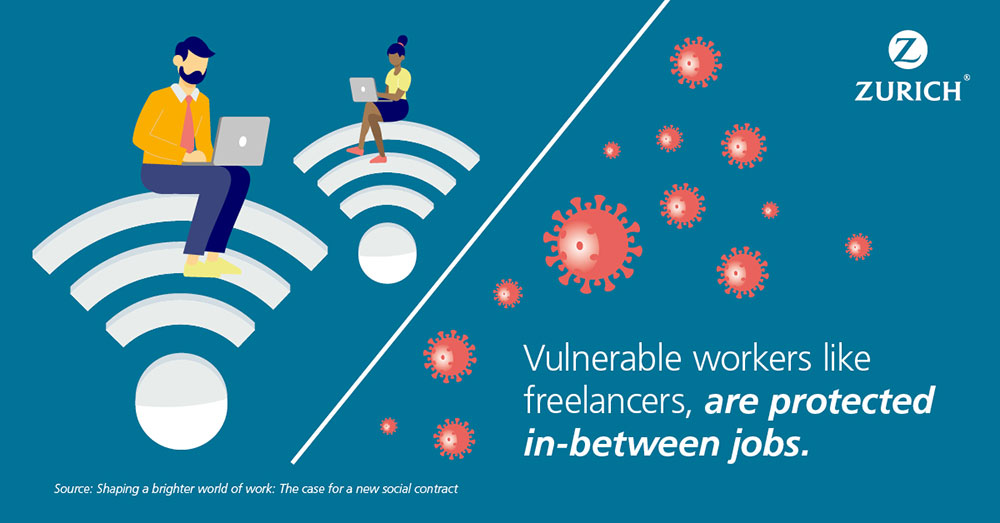The future of employee benefits and insurance in a post-Covid world
Future of workArticleOctober 5, 20208 min read
By working together we can help employees to have the financial security and peace of mind they need to navigate today’s challenges in the world of work.
The pandemic has caused a deep economic shock, with millions out of work or working part-time. Companies and their employees are facing significant challenges, and the pre-COVID-19 world of work is unlikely to return for some years, if ever.
With social support systems fraying, the burden of this challenging landscape increasingly falls on the individual. But for many organizations, the pandemic has also reinforced just how much they rely upon their human capital as they rebuild operations to reflect the changed circumstances.
Shaping a brighter world of work: The employer outlook, one of our latest reports, finds that there is a growing consensus that companies with an ambition to be employers of choice must take on greater responsibility for adapting their insurance and related benefits offerings to their employees’ evolving needs. In turn, this points to the importance of the human resources and compensation and benefits function in a company’s global strategy.
The employer outlook report and the latest flagship report entitled, Shaping a brighter world of work: The case for a new social contract, draw on insights from Zurich Insurance Group’s five-year research collaboration with the Smith School of Enterprise at University of Oxford. The insights are based on responses from around 19,000 workers across 17 countries, 1,200 businesses, consumer surveys and in-depth interviews with Zurich business customers on the future of work amid a pandemic.
We know that people’s past financial vulnerability has a bearing on their long-term financial health. The effects of COVID-19 could be felt even after a widely forecast recession (or even depression) has come and gone. Left to their own devices, people’s propensity to plan for retirement and other long-term financial goals will be eroded. All of this points to a strong need for employers not only to take a key role in providing for their workers’ retirement security, but also to provide them with guidance on how to build and manage assets over the course of their careers. As we are all working longer and more and more responsibility is put on individuals’ shoulders, health and wellbeing needs to be considered as one of the most valuable assets which needs to be protected.
At the same time, where benefits were previously not always important to employees, there is now an opportunity to avail of their newfound interest and engagement. Insurance and related benefits had a mixed record before the pandemic in terms of their importance to employees. Now that so many have experienced a financial shock, it seems there will be greater scope for employers to use benefits as a tool to motivate their staff. In particular, while millennials may have been less responsive to insurance benefits as an incentive to take or stay in a job before COVID-19, they will now be more risk-averse and likely to engage on these issues with their employers.

Before the onset of the pandemic, there had been moves in company-based benefit systems towards the individualization of health and welfare packages. Moreover, considerable resources had been invested in online systems and training so that employees can better understand what is available to them. This trend is likely to continue independently of the effects of COVID-19. That said, the costs for some companies in financial difficulty due to the pandemic may be such that they will be unable to maintain different types of health and welfare benefit systems for different types of employees.
Our research suggests that companies strive to adhere to industry and regulatory standards when it comes to providing benefits and not be “laggards,” which could hurt their competitiveness against their peers in the same jurisdiction. A minority of companies will offer benefits above and beyond the legal minimum for reasons of competitiveness. This can be true even in countries where occupational pensions are mandatory, such as Switzerland and Australia. Overall, however, few employers see a strong advantage in setting an industry standard when it comes to offering attractive benefits, given both the costs of doing so and the relative lack of engagement from staff.
“In particular, young people and workers of all types should understand that their biggest asset often is their future income and that they need to protect it.”
Stefan Kroepfl, Global Head of Life Business Analysis, Life Technical Functions, Zurich Insurance, said that the report confirmed that people were concerned about protecting their futures, even at a time when the priority was getting through the immediate challenge of COVID-19. “This is apparent across all ages. Planning for retirement is a universal concern.” Employers had a responsibility to ensure that their employees understand the importance of protection and know what options are available, Mr. Kroepfl said. “In particular, young people and workers of all types should understand that their biggest asset often is their future income and that they need to protect it.”
While companies see themselves as having a role in enhancing financial wellbeing, they are less certain about how to fulfill it.
- 64% of survey respondents saw their own companies as having a role in educating their employees on financial planning, resilience, and wellbeing solutions.
- Three-quarters (76%) believed that financial well-being received the same level of attention as physical and/or mental well-being.
- To that end, 68% had introduced education programs (whether online or in-person) designed to provide employees with knowledge and understanding of their financial and insurance benefits.
COVID-19 has also exposed the fragility of freelance contracting arrangements for many types of workers while further enhancing their more appealing aspects to companies trying to contain costs. Freelancing was valued by many workers as a ticket to flexibility and career growth, albeit at the expense of stability and certain employer-sponsored benefits. Time will tell whether these same people will now place greater value on the security of more traditional working arrangements. On the other hand, if unemployment insurance and pooled, lower-cost benefits could be made available to freelance and gig economy workers (as for employees) as part of a new social contract, then the stark divide between working inside and outside of an organization would become an outdated idea.
Employees may well need to carry a broad range of insurance products which are consistent with the risks that they may face in the immediate future and over the long term. Given the associated costs of maintaining a healthy work environment, providing these benefits will require the commitment of employers, employees, and governments. It seems unlikely that governments will, or can afford to, extend public health and welfare systems.
“Addressing the holistic needs of the workforce as they transition through different stages of work is the key to building sustainability into their work life.”
Wendy Liu, Head of Corporate Life and Pensions at Zurich Insurance Group, said: “Work has become part of the employees’ lifestyle, with the line between personal and professional life getting thinner. Technology has sped up this evolution. Employees value personalized employee benefits tailored at their needs much more than the traditional standard design.
“Addressing the holistic needs of the workforce as they transition through different stages of work is the key to building sustainability into their work life. It has become more critical for employers to communicate and engage with employees to help them to better understand the various benefits provided and what gaps in their work life need to be addressed.“
As the economic fallout from the pandemic continues, it may feel premature to think about many of these issues. But the costs of ignoring them are greatly outweighed by the benefits of starting to build a new social contract now. Employers are on the front lines of a rapidly evolving world of work and are best placed to lead change in building back better.






